|
Tragic Loss for Village - Bob Todd's tragic death, more...
Revel Photo Exhibition and Coffee Morning, Saturday, 17th September, more...
25th Anniversary of Village Hall, more...
Sun Shone on Revel, more...
Tales of the Village: His Motto Is "Get Involved" - Pucklechurch News interviews Les Whittock, more...
Tragic Loss for Village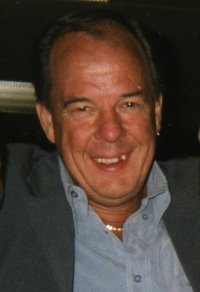
It's hard to write about something that is so raw and so terrible, but the news of Bob Todd's tragic death while trying to do the right thing cannot go unmentioned in the Pucklechurch News. This village has not been without its troubles -- though the teenagers charged in this incident were from Kingswood -- but the awful chain of events of Saturday, August 6th, came to such a horrific conclusion that it sent a shock wave through our community. Villagers can only hope that justice will be done.
Bob will be remembered for his warm welcome of locals and visitors alike to the Star Inn, for his quick wit, for his love of rock and roll, and most of all for his willingness to help people. He extended a helping hand to individuals, such as the young lad with drug problems whom he cared for and counselled, and to the many village charities and wider causes whose organisers needed a place to hold a meeting, a quiz, a race night, or an auction. In looking through the book of thank-you notes and clippings that Bob kept, I was struck by how deep and wide his generosity went -- virtually every organisation in the area had come to Bob for support at some time… and received it.
Bob and Diane came to the Star Inn nine years ago, having entered the pub trade two years earlier when they took over the Bridge in Shortwood. The couple met when Bob was 16 and Diane 15. Diane recalled when they first met at a fun fair in Marshfield. The rides were sixpence and she had 5½d, so Diane and her friend approached Bob and asked him for a ha'penny. He came back quick as anything with, "My mum don't let me carry big change like that." Bob walked Diane home from that fun fair, and the rest is history. They married in 1968 while they were both still teenagers. The lad from Lincolnshire was here to stay.
Bob's quick wit and humour stood him in good stead through the years. He was never a bouncer but a "crowd control technician". When he had a business setting up exhibitions, he was an "exhibitionist". And when he became a publican, his sense of humour and warm heart made him both popular and respected. From the first day he came to Pucklechurch, he was eager to get involved with village events. He was an active member of the Revel Committee and the Beer Festival Committee and gave his time and his voice to so many other good causes.
Bob Todd will be sorely missed by his family, his staff, his friends, and the village at large. His death and that of Bob Stone earlier this year leave a huge void in Pucklechurch. So many village organisations are crying out for members or volunteers. Helping a youth group, giving some time to a village organisation, raising money for a local cause, or even joining a club would all help to fill this void. It would also honour the memory of two people who cared so much about this village.
Jacki Berry
The eulogy given by Lyn Smith may be viewed here.
Further information may be found by clicking on the links below and searching for 'Pucklechurch'
http://www.epost.co.uk
http://www.westpress.co.uk
http://www.bbc.co.uk/bristol
[top]
Revel Photo Exhibition and Coffee Morning, Saturday, 17th September
Come along to the Revel coffee morning and photo exhibition on Saturday, 17th September, from 10am until 1pm in the Village Hall. Enjoy a cuppa and talk to members of the Revel Committee about Revel events and how Revel funds have been used in the village. Give us feedback on Revel, tell us about any new ideas you have for raising funds in the village, and let us know where we could improve. If you think you would like to get involved -- even just a little bit by helping with one specific event or task -- come and see what it is we do to pull together the events that contribute in a very real way to village life.
Also on that morning, the results of the Bob Stone Memorial Photography Competition will be exhibited. All entries will be displayed and the winners announced. Winning entries in the Pucklechurch Village Life category will be made into postcards. Come and see how creative your neighbours are!
[top]
25th Anniversary of Village Hall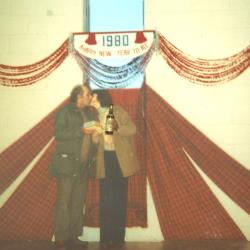
This October marks the 25th anniversary of the Pucklechurch Community Centre. The new village hall was dedicated in October 1980, after a group of villagers made it through the long haul of fundraising, planning applications, design consultations, and construction to create a resource that better suited the growing village. The hall was built to replace the Miner's Institute, a small, dark building that had ceased to meet the needs of the village organisations that wanted to use it. (See "Tales of the Village" for related story.)
In October, the Pucklechurch Community Association will host an open day on a Saturday yet to be determined. All groups who use village hall facilities will be asked to put on a display of what they do, so you can come along and explore the various organisations that might take your fancy as a member or volunteer.
[top]
Sun Shone on Revel
(click on any image to see larger version)
This year's Revel Week was blessed by (mostly) good weather and an excellent turnout for events. Starting with the Treasure Hunt on Saturday afternoon, won by Chloe Rawlins, and the Revel Ramble on a glorious Sunday morning, events filled the week to bring villagers together to celebrate our community. The youth folk dance was  well attended, as was the Friday night disco. Cash prizes of £20 for the Pram Race brought a few teams and a few spectators out (a light drizzle didn't help), with the Tohil Leaders (Ed Rogers and Steve Dau) taking the prize for the over 18s, and the Dicks from Wick (Dominic Bannell and Steven Thomas) winning the cash for the under 18s.and collecting for muscular dystrophy along the way. The Tower Tarts (Sarah Miller and Laura Richards), representing Tower Playgroup, won the prize for the best fancy dress and kindly donated the cash they collected along the way to Revel funds. The Revel Beer Festival, which sold out both Friday and Saturday nights, went off well and raised thousands of pounds for village causes. This year's event featured real ales and ciders from the Southwest, giving everyone the chance to try some of the best England has to offer. well attended, as was the Friday night disco. Cash prizes of £20 for the Pram Race brought a few teams and a few spectators out (a light drizzle didn't help), with the Tohil Leaders (Ed Rogers and Steve Dau) taking the prize for the over 18s, and the Dicks from Wick (Dominic Bannell and Steven Thomas) winning the cash for the under 18s.and collecting for muscular dystrophy along the way. The Tower Tarts (Sarah Miller and Laura Richards), representing Tower Playgroup, won the prize for the best fancy dress and kindly donated the cash they collected along the way to Revel funds. The Revel Beer Festival, which sold out both Friday and Saturday nights, went off well and raised thousands of pounds for village causes. This year's event featured real ales and ciders from the Southwest, giving everyone the chance to try some of the best England has to offer.
 And the sun shone on Revel Day! The parade was bigger and better this year, with many colourful floats and a host of marching entries. The 2nd Pucklechurch Brownies won the award for the best children's walking entry, 1st Pucklechurch Rainbows won for the best children's float, and the WI float won the award for the best adult entry. Each winning entry was recognised with an award banner during the parade, and the And the sun shone on Revel Day! The parade was bigger and better this year, with many colourful floats and a host of marching entries. The 2nd Pucklechurch Brownies won the award for the best children's walking entry, 1st Pucklechurch Rainbows won for the best children's float, and the WI float won the award for the best adult entry. Each winning entry was recognised with an award banner during the parade, and the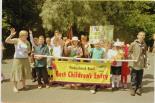 group took home £50 for their efforts. The parade was led by young pixie Joshua Venning, followed by this year's royal court: Revel Queen Jade Venning, King Thomas Bromiley, Princesses Kira Winter and Kezia James and Prince Kane Winter. This year ASDA took over the spot as our main sponsor by kindly donating three lorries for the parade and sponsoring the printing of the raffle tickets. group took home £50 for their efforts. The parade was led by young pixie Joshua Venning, followed by this year's royal court: Revel Queen Jade Venning, King Thomas Bromiley, Princesses Kira Winter and Kezia James and Prince Kane Winter. This year ASDA took over the spot as our main sponsor by kindly donating three lorries for the parade and sponsoring the printing of the raffle tickets.
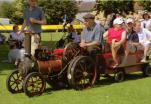 This year's Revel field events included a gun dog and falconry demonstration and the Harley-Davidsons, who returned once again to flash their chrome and make their engines roar. The hot day brought out the crowds, who enjoyed Bristol Zoo's This year's Revel field events included a gun dog and falconry demonstration and the Harley-Davidsons, who returned once again to flash their chrome and make their engines roar. The hot day brought out the crowds, who enjoyed Bristol Zoo's 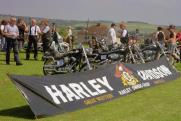 creepy-crawlies, the Scouts' burger barbecue, the fun fair, and the many and various stalls run by village organisations. More than a hundred prizes were donated for the raffle, with the top prize of £100 donated by Baylis. creepy-crawlies, the Scouts' burger barbecue, the fun fair, and the many and various stalls run by village organisations. More than a hundred prizes were donated for the raffle, with the top prize of £100 donated by Baylis.
The accounts are not yet finalised for Revel, but it looks like the events this year raised about £5,000 for village causes. A big thank you goes to the Revel Committee for making these events possible: Cyndi Hill (Chair), Mandi Smith (Vice Chair), Chris Murphy (Secretary), George Hill (Treasurer), Bethan Smith, Bob Todd, Carol Humphrey, Derek Watts, Elaine Stone, Greg Bate, Helen Parker, Jacki Berry, Karl Fuerstenburg, Mark Humphrey, Martin Smith, and Tony Humphrey. Let's not forget the Beer Festival Committee, whose members included Tom Murphy, Mike Rawlins, Richard Forman, Tony Beazer, Bob Todd, Greg Bate, Tony Humphrey, Lyn Smith, and Dave Sargent.
[top]
Tales of the Village: His Motto Is "Get Involved"
Pucklechurch News interviews Les Whittock
Les Whittock is so much a part of this village that it seems that he has always lived here, but it was a mere 50 years ago that Les, his wife Mary, and his two young children moved to Pucklechurch. Les was an agricultural worker, and he came to work for Mr Hudson at Cranford Farm, behind the Star Inn. In those days, farm workers changed jobs either in March on Lady Day or in September at Michaelmas, after the harvest. Les had been working at a farm in Old Sodbury, but as his eldest daughter approached school age, the family wanted to be closer to a school to save Mary a long walk every day.
Being the newcomers in a small village -- Pucklechurch had only about 1,000 residents then -- made the Whittocks something different. "When we were new in the village, some people in the village stared at us, but we just got on with it," remembers Les. "One of my first impressions was it was a miners village. When you walked along Hillview, there were one or two miners still left, and they were still getting their free coal. You would see a massive heap of coal in the garden. That was one of the perqs they had as a miner, two tons a year of free coal. It stunned me a bit to see all that coal."
At Cranford Farm, Les milked the cows, drove the tractor, and did general farm labour. He remembers mowing the grass with a contraption that had been modified from the days of horse-drawn mowers. "You didn't press buttons then, you had to use your arm power to do everything. Mowing the grass you had a five-foot blade that went backwards and forwards. Behind your tractor you had a big, long lever."
A slipped disc put an end to Les's agricultural work, and he went to work for Horsell's Printing, which was housed in a Nissan hut in the centre of the village. His job was to drive all around Avon, Somerset, Devon, and Wiltshire picking up the metal sheets used on printing presses and bring them back to Pucklechurch where they would be cleaned off for re-use. This began a career in driving: selling bread for Mother's Pride from a van with the trademark chipmunk perched on top, selling cakes for Nabisco all around the West Country, and making deliveries for United Carriageways in the Welsh valleys.
The Whittocks attended the Congregationalist chapel, the building that is now derelict in the centre of Pucklechurch. The church needed a representative on the village hall committee, but no volunteers stepped forward. Les took the bait, however. "I stuck my neck out and said I'd do it, to see what it was all about. I'd just sit there and listen to what was going on, to get used to people. That was my first official public duty." The committee ran the old village hall, what had been the Miners' Institute.
Built in 1924 at a cost of £1,000, the "miners' hut" had been financed by a tuppence a ton contribution from the miners of the parish. Parkfield Mine closed in 1936, but the miners and ex-miners who lived in the area continued to use it as their private club. After a number of years without a mine in the parish, the Pratt brothers at Marsh Farm tried to get the miners to hand the hut over to the village. The miners were reluctant to give up their club, but the Pratts eventually persuaded the Miners' Union to open the building for general village use in about 1946. The villagers formed a committee to run it as a village hall.
By the time Les joined the committee in 1956, Pucklechurch was starting to outgrow the old village hall. New estates were planned and being built. The people moving out to Pucklechurch from Bristol and other cities were put off by the dingy, old hall. "It was like being in a coal mine," says Les. "The interior was almost the same colour as the outside, very dark and drab. It was just a small wooden place, but we had to use it because there was nothing else in the parish." And use it they did. The miner's hut hosted a dance club, bingo, card games, and plays.
The building was ageing, however, with uneven floors and dodgy wiring. At one point the floor got so bad that it had to be covered with chipboard to make it danceable. "One Saturday night there was a dance held in aid of Revel funds," recalls Les. "It was a nasty, dirty, wet night, and there was lots of thunder and lightning. The lights kept ditching out in the social club, which was on the other side. They kept coming in and complaining to us about turning the lights off in the social club, but it was nothing to do with us. Eventually, just before midnight, the whole system was knocked out. I thought I'd go home and get a few candles. Somebody else said they'd get some too. We ended up dancing by candlelight. We probably had a few dozen candles around. Everybody was quite happy about it in the end."
Another time a model railway exhibition was brought in to raise funds for Revel. It was quite valuable, so the Scouts were asked to stay there overnight to look after it. What Les didn't tell them was that the hall had night-time visitors. "Cockroaches love beer. Because the social club was there, of course beer was splashed onto the floors. If you'd creep in there at night and turn on the light, you'd see it black with cockroaches. So when we had these Scouts there, I knew what was going to happen. I didn't tell anyone because then they wouldn't have done it. The following morning, they complained about all these cockroaches. It took a long time before I would admit to anyone that I knew what was going to happen."
In the late 1960s the pressure for a new village hall was starting to build, but in the '70s it really hotted up. More people began to get involved, Jim Higgins became chairman, and Les joined the planning committee as secretary. It was then that his extensive travelling around the region paid off for Pucklechurch. "I travelled from Cornwall to Hereford, and if I went to places where there was a village hall, I'd go look inside to see if it had something we could use. I would look at the structure of the building and what was inside." Les would ask questions about the population of the village and how the hall was used. He became more and more convinced that the committee needed to think big. "I told them, 'We want a big place -- a big place! Let's get the size right, and then let's raise money to put the refinements in afterwards.' That's why we went for what we have now."
Things progressed slowly. There was some contention over who would call the shots. The people running the social club thought they should be in charge, but others thought that it should be a general committee drawn from interested parties in the village. At the time, there were laws prohibiting a social club from running a building that was in effect a charitable operation. Eventually a design was agreed and an architect drew up the plans. The construction cost was estimated at £60,000. Fundraising began in earnest.
Much as it is today, Revel was the main focus of fundraising for the village. After a long hiatus, Revel was restarted in 1951 by village mayor Harry Smart. "He was the headmaster of the village school; he was the church warden; he was the parish council chairman; he was chairman of Revel committee. He was very dedicated to what he was doing, but if Harry said it, you did it."
Les got his teeth into Revel fundraising by organising the first cream teas. "A chappie involved with the prison social club on the catering side said, 'I'll get you some cream, some scones, and some jam.' I sat on the stage in the old hall in the semi-dark. Vera Blackmore came and helped me cut the scones and put the jam on the plates. That's how cream teas started, and it's now quite an event."
At the time, the Revel Committee was flagging because too few people wanted to get involved. There was a special meeting chaired by Ros Abbott to call for more volunteers. Along to that meeting came Dr George Conrad, who lived in Pucklechurch House. "That's when we started the beer festival," says Les. "We wanted a real ale festival. George was friendly with the son of the manager at the Rose and Crown, who, unknown to us, contacted the students' union magazine. Well, we had a couple of tables in George's garage with two or three barrels on it, and the first night we wondered where everybody was coming from! We thought that if sold 75 pints, we'd be quids in, but there were hundreds and hundreds of them! People were queuing for at least half an hour to get their beer. We had to lock the gates at 9 o'clock. They reckon that all the pubs within about five miles from here sold out of beer. We learned a lesson. George brought his greenhouses into action the next year, and people could walk around in the garden. We raised about £1,000 a year on the beer festival. It went on for 13 years while George was here. Then when he left, Pucklechurch House disappeared off the scene." The committee ran the beer festival in a marquee on the Rec for a couple of years, then when Bob Todd took over the Star, he gave the beer festival a new venue, where its contribution to Revel funds has continued to grow.
After more than a decade of fundraising, the community had raised enough for the new hall and construction began. The committee had decided to get the structure of the building done right and scrimp on the finishing touches. The original floor was made of plywood planks and the ceiling had inexpensive solid tiles because they couldn't afford acoustic ones. "If you and I were standing next to each other, you couldn't understand what I said and I couldn't understand what you said. It was diabolical. If the hall was full up, though, that was OK. We had that for several years, then we got the Bristol University acoustic people involved, and they came down and did what you call a screech test. They said, if you're going to put up acoustic tiles, start at the back end and work forward because if you can't afford to do that end, it won't matter so much. So that's how the acoustic tiles came into being. It cost us £7000 to have those put up."
The hall was opened for its first real event on New Year's Eve 1980. There was no heating, so the committee hired some large gas heaters. The ceiling was festooned with Scots plaid, and the hall played host to a lively New Year's Eve dance. The intent was then to close up the hall until March when the heating was due to be installed. Unfortunately, once the heaters were taken away, the dampness crept in and the thin floorboards buckled. "We were very worried about it," Les recalls. "There was a massive great lump where the floor came up in two places, but when we got the heating system put in, it went down again. I used to go over to the hall with concrete nails and nail the floor down so that that people wouldn't trip." After a number of years, the committee got some grant money, about £10,000, and put down a proper tongue and groove floor.
Even with the old village hall, which was demolished in 1983, there were gaps in the schedule. An idea was cooked up at a barbecue one night, where Les chatted with Alan Holder, Les Savage and their wives. "We were saying it would be nice if we had our own folk dance club. Of course, muggins says, 'I probably know one or two people who could give me some advice.' And they did -- they helped us start up. We progressed from there and got various callers from different places. That's how we got going in 1976 in the old building." After the new hall opened, the folk dance club grew from a dozen people to about 20. There are now over 60 members from all over the region, and the bookings for the fortnightly dances support the village hall and help keep it open. The club also hosts two big functions a year, a Christmas dance, and a New Year's Eve dinner dance. The members are very loyal, and the club has been running for almost 30 years now. Les retired as chairman of the organising committee just last year, having for 14 years.
In another effort to fill up vacancies in the new village hall, Les was instrumental in bringing short mat bowls to Pucklechurch in 1991. He had been giving the village of Kew Stoke some advice during their campaign for a new village hall, and they had invited him to a bowls exhibition in the completed building. He was bowled over by the possibilities. The folks doing the exhibition loaned the bowling mat to Pucklechurch, Les put up adverts around the village, and the activity soon gained quite a following and was running four times a week. Les still bowls regularly, though not as often as he used to do.
In his time, Les was also involved with the youth club. "I used to come home on a Monday night -- finish work at 6 or so -- go without my tea, and go look after the junior youth club. It was the same problem getting people in those days. You can understand why they're non-existent today. I ran the junior section. Jean Wilcox ran the senior section. Sammy Lavington used to take the teenagers." Les despairs when people today complain about the lack of activities. "When people say, why doesn't this happen or that happen, it's because people won't help get them started. At the beginning, I knew nothing much about these things, but I took the bull by the horns. It was only the fact that I didn't like to see all these vacancies and the hall losing money, so I said, 'Let's have a go at something.'"
It was pretty much inevitable that Les would end up in local government. "I wasn't involved in the Parish Council," says Les, "but since I knew Harry Smart from the village hall committee, I eventually got involved." At first Les just went along to meetings, sat and listened. Tom Moss was the chairman, and the group was very tight-knit, so Les felt a bit of an outsider. A vacancy came up in 1981, however, and Les was co-opted into serving. Elections came up the following year, and he was duly elected and has served on the Parish Council ever since.
What has Les got out of his lifetime of involvement in the local area? A sense of belonging, a feeling of accomplishment, and the chance to hob-nob with royalty. Twice Les has been to royal functions by virtue of his community involvement. His participation with Community Action led to an invitation to a garden party with the Queen at Buckingham Palace in 1991, and earlier this year he had the chance to chat with Princess Anne at a Community Action function in North Somerset. While these are moments Les will always treasure, the thing that really keeps him going is staying involved with the village he loves. Looking back at his contributions over the years -- the time he gave to get a new building on the ground and new ventures off the ground -- imagine how different our village would be without his steadfast efforts to make a difference.
[top]
|








